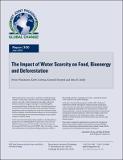| dc.contributor.author | Winchester, N. | |
| dc.contributor.author | Ledvina, K. | |
| dc.contributor.author | Strzepek, K. | |
| dc.contributor.author | Reilly, J.M. | |
| dc.date.accessioned | 2017-10-06T19:12:14Z | |
| dc.date.available | 2017-10-06T19:12:14Z | |
| dc.date.issued | 2016-07 | |
| dc.identifier.uri | http://hdl.handle.net/1721.1/111800 | |
| dc.description.abstract | We evaluate the impact of explicitly representing irrigated land and water scarcity in an economy-wide model on food prices, bioenergy production and deforestation both with and without a global carbon policy. The analysis develops supply functions of irrigable land from a water resource model resolved at 282 river basins and applies them within a global economy-wide model of energy and food production, land-use change and greenhouse gas emissions. The irrigable land supply curves are built on basin-level estimates of water availability, and the costs of improving irrigation efficiency and increasing water storage, and include other water requirements within each basin. The analysis reveals two key findings. First, explicitly representing irrigated land at has a small impact on food, bioenergy and deforestation outcomes. This is because this modification allows more flexibility in the expansion of crop land (i.e. irrigated and rainfed land can expand in different proportions) relative to when a single type of crop land is represented, which counters the effect of rising marginal costs for the expansion of irrigated land. Second, due to endogenous irrigation and storage responses, changes in water availability have small impacts on food prices, bioenergy production, land-use change and the overall economy, even with large scale (~150 exajoules) bioenergy production. | en_US |
| dc.description.sponsorship | Primary funding for this research was through a sponsored research agreement with BP. The authors also acknowledge support in the basic development of the Economic Projection and Policy Analysis model from the Joint Program on the Science and Policy of Global Change, which is funded by a consortium of industrial sponsors and Federal grants including core funding in support of basic research under U.S. Environmental Protection Agency (EPA‑XA‑83600001) and U.S. Department of Energy, Office of Science (DE‑FG02‑94ER61937). For a complete list of sponsors see for complete list see http://globalchange.mit.edu/sponsors/current.html). | en_US |
| dc.language.iso | en_US | en_US |
| dc.publisher | MIT Joint Program on the Science and Policy of Global Change | en_US |
| dc.relation.ispartofseries | MIT Joint Program Report Series;300 | |
| dc.title | The Impact of Water Scarcity on Food, Bioenergy and Deforestation | en_US |
| dc.type | Working Paper | en_US |
| dc.identifier.citation | Report 300 | en_US |

